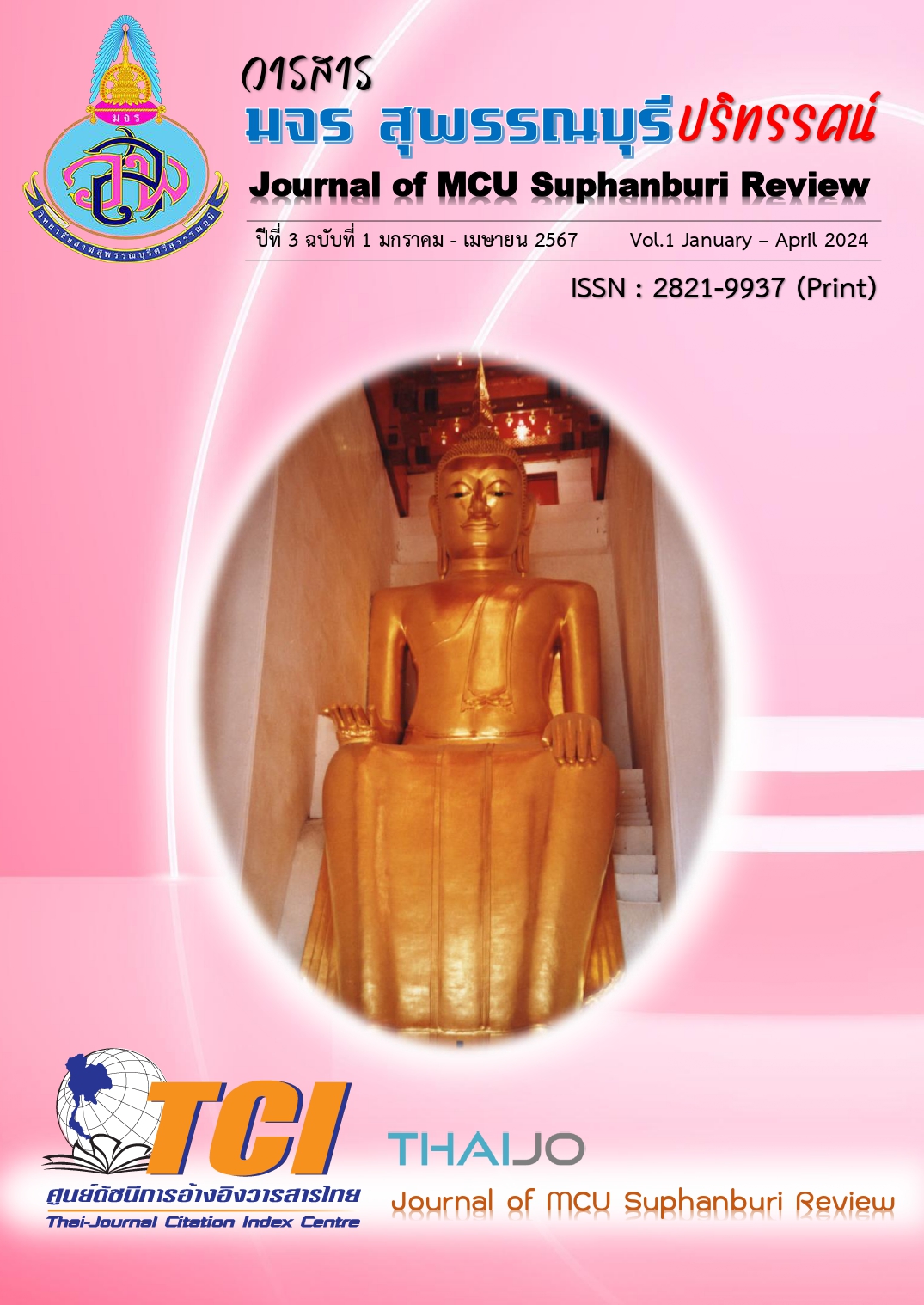Applying Buddhist principles in living a happy life
Keywords:
Applying, Buddhist principles, happy lifeAbstract
We humans will live happily in society. Without principles or virtues, it cannot be. Because humans are social animals, they must eat and consume. Human livelihood is self-interest. Coupled with the true nature of human beings are often selfish. like to take advantage of others if human beings lack the Buddha Dharma in mind Livelihood has to be wounded. quarrel with the battle to kill each other to fight the war. However, the human race has been trained in morality.
Morality has been around for a long time. Thus, people have a sense of morality and ethics in their hearts. various violent events therefore difficult to occur Notice the events of the country today. Therefore, there are many ways to implement the principles of Buddha Dharma in life. may start with one of the principles and adhere to practice which may lead to principles of practice at the heart of Buddhism such as Ditthammikattha benefits, kihi practice, 4 powers, etc. These Buddhist principles all contribute to the well-being of life. Disciples should pay attention to implement them regularly, it will be very useful.
References
มหาจุฬาลงกรณราชวิทยาลัย. พระไตรปิฎกภาษาไทย. กรุงเทพมหานคร : มหาจุฬาลงกรณราชวิทยาลัย,2539.
มหาจุฬาลงกรณราชวิทยาลัย. พระไตรปิฎกและอรรถกถาภาษาไทย. กรุงเทพมหานคร : มหามกุฏราชวิทยาลัย, 2525.
มหาจุฬาลงกรณราชวิทยาลัย. (2539). พระไตรปิฎกภาษาไทย ฉบับมหาจุฬาลงกรณราชวิทยาลัย.กรุงเทพมหานคร: โรงพิมพ์มหาจุฬาลงกรณราชวิทยาลัย.
มหามกุฏราชวิทยาลัย. พระไตรปิฎกและอรรถกถาภาษาบาลี. กรุงเทพมหานคร : มหามกุฏราช วิทยาลัย, 2525.
พระธรรมปิฎก (ป.อ.ปยุตฺโต). (2539). การพัฒนาที่ยั่งยืน. พิมพ์ครั้งที่ 2. กรุงเทพฯ: มูลนิธิโกมลคีมทอง.
พระธรรมปิฎก (ป.อ.ปยุตฺโต). (2542). พุทธธรรม. กรุงเทพฯ: มหาจุฬาลงกรณราชวิทยาลัย.
พระพรหมคุณาภรณ์ (ป.อ.ปยุตโต). 2550. ธรรมนูญชีวิต. พิมพ์ครั้งที่4. กรุงเทพฯ: สำนักงานพระพุทธศาสนาแห่งชาติ.
พระเทพคุณาภรณ์ (โสภณ โสภณจิตฺโต ป.ธ. 9) (2551)
พุทธธรรมกับการปฏิบัติงานราชการ, 2550 อ้างถึงใน ธนภณ สมหวัง, 2543)
พระไพศาล วิสาโล. (2553). “รู้สติ” วิถีแห่งความสุขในสังคมที่คิดต่าง. นิตยสารหญิงไทย. 833(35).
พระมหาสุทิตย์ อาภากโร และเขมณัฎฐ อินทรสุวรรณ. (2553). ตัวชี้วัดความสุข: กลยุทธ์การสร้างและการใช้เพื่อชุมชนเป็นสุข. กรุงเทพฯ: สถาบันเสริมสร้างการเรียนรู้เพื่อชุมชนเป็นสุข.
พุทธทาสภิกขุ. (2542). ความสุขสามระดับ. พิมพ์ครั้งที่ 2. กรุงเทพฯ: สุขภาพใจ.
มหาจุฬาลงกรณราชวิทยาลัย. (2539). พระไตรปฎกภาษาไทย ฉบับมหาจุฬาลงกรณราชวิทยาลัย.กรุงเทพฯ: มหาจุฬาลงกรณราชวิทยาลัย
สุริยัญ ชูช่วย. (2545). การแสวงหาความสุขและคุณค่าของชีวิต กรณีศึกษาทัศนะกลุ่มคนต่างวัยในกรุงเทพมหานคร. วิทยานิพนธ์ศิลปะศาสตร์มหาบัณฑิต. นครปฐม: มหาวิทยาลัยมหิดล
อัจฉราวรรณ กันจินะ 2564 .ความสุขในพระพุทธศาสนา. โรงเรียนนวมินทราชูทิศ พายัพ จังหวัดเชียงใหม่.บทความวิชาการ
พระครูธรรมธร (ครรชิต คุณวโร). (2556). การพัฒนาความสุขในพุทธธรรม. วารสารศึกษาศาสตร์.15(1), 91.
สมเด็จพระพุทธโฆษาจารย์ (ประยุทธ์ ปยุตฺโต) พจนานุกรมพุทธศาสตร์ ฉบับประมวลธรรม พิมพ์ครั้งที่ 12 พ.ศ. 2546, [ออนไลน์], แหล่งที่มา: http://84000.org/tipitaka/dic /d_ item. php?i=172, [วันที่ 9 กันยายน 2564]
Downloads
Published
Issue
Section
License
Copyright (c) 2024 MCU Suphanburi Review

This work is licensed under a Creative Commons Attribution-NonCommercial-NoDerivatives 4.0 International License.






